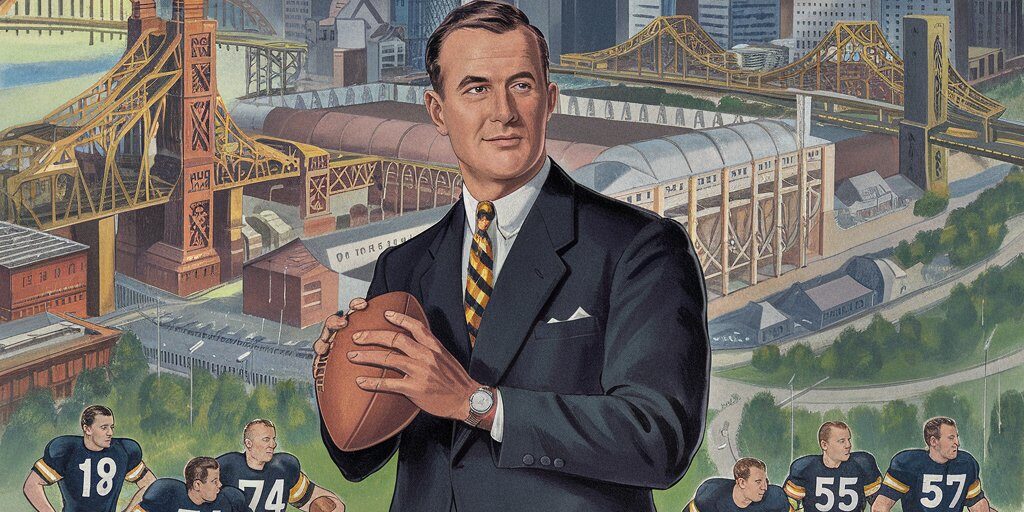Introduction: The Man Behind the Team
Few figures are as closely tied to Pittsburgh’s identity as Art Rooney Sr., the founder of the Pittsburgh Steelers. What began as a struggling football franchise in the 1930s — often called the “lovable losers” — eventually became one of the most successful dynasties in NFL history.
Rooney’s story is one of resilience, grit, and deep Pittsburgh roots. His founding of the Steelers wasn’t just about football — it was about giving the city a team that embodied its blue-collar spirit.
Art Rooney’s Early Life: A Son of Pittsburgh
Born January 27, 1901, in Pittsburgh’s North Side, Art Rooney was the son of Irish immigrants. Raised in a tough, working-class neighborhood, Rooney grew up loving sports — particularly baseball, boxing, and horse racing.
Key Facts:
- Star athlete at Duquesne University Prep and Indiana Normal School.
- Played semi-professional baseball and boxed professionally.
- Built his fortune through successful horse racing bets and investments.
Rooney’s colorful early life as an athlete, gambler, and sports promoter laid the groundwork for his future in professional football.
The Birth of the Pittsburgh Steelers (1933)
In 1933, Pennsylvania finally legalized professional football — creating an opportunity Rooney couldn’t resist.
The Franchise:
- Rooney paid $2,500 (about $57,000 today) to establish Pittsburgh’s first NFL team.
- Originally named the Pittsburgh Pirates (like the city’s baseball team).
- Played their first game on September 20, 1933, against the New York Giants.
Early Struggles:
- The team struggled financially and athletically for years.
- Between 1933 and 1942, the Pirates/Steelers had only one winning season.
- Rooney often had to scramble for money to keep the team afloat.
The Name Change and War Years (1940s)
In 1940, Rooney rebranded the team as the Pittsburgh Steelers — honoring the city’s industrial roots.
World War II Challenges:
- The war drained NFL rosters.
- Rooney merged his team twice with others to survive:
- “The Steagles” (1943): Merged with the Philadelphia Eagles.
- “Card-Pitt” (1944): Merged with the Chicago Cardinals.
Despite these challenges, Rooney’s steadfast loyalty to Pittsburgh kept the team alive.
The Long Road to Success: Rooney’s Patience Pays Off
For decades, the Steelers were known for losing seasons and quirky players — but Rooney never wavered:
Turning Points:
- 1955: Hired his son, Dan Rooney, who would play a crucial role in the team’s future success.
- 1969: Hired Chuck Noll as head coach — a franchise-defining decision.
The 1970s Dynasty:
- Drafted legends like Mean Joe Greene, Terry Bradshaw, Franco Harris, and Jack Lambert.
- Won four Super Bowl titles (IX, X, XIII, XIV) between 1975-1980.
Art Rooney’s vision — and patience — paid off as the Steelers became the NFL’s most dominant team.
The Chief: Rooney’s Legacy in Pittsburgh
Known affectionately as “The Chief”, Rooney was beloved in Pittsburgh for his humility, generosity, and deep community ties:
- Regularly attended church, bars, and community events.
- Famous for carrying wads of cash, tipping generously, and helping those in need.
- A symbol of Pittsburgh’s working-class heart.
Accolades:
- Inducted into the Pro Football Hall of Fame in 1964.
- The team’s practice facility is named the “UPMC Rooney Sports Complex”.
- Passed away in 1988, but his family — the Rooney dynasty — continues to run the Steelers.
Conclusion: The Blueprint for a Football Legacy
Art Rooney Sr. didn’t just create a football team — he created a Pittsburgh institution. His belief in hard work, loyalty, and community built the Steelers into one of the most respected franchises in sports.
From humble beginnings to Super Bowl glory, the story of Art Rooney and the Steelers is a reminder that success isn’t always instant — but with perseverance and heart, greatness is possible.









